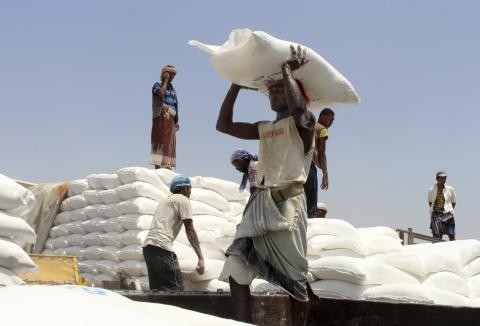Yemen Cholera Response Mechanism


Full title of the project: Yemen Cholera Response Mechanism
Target areas: Bani Al-Harith District
Recipient: Yemen
Donor: Japan
Contribution: USD 1 000 000
02/03/2018-15/06/2019
Project code:OSRO/YEM/801/JPN
Objective: To design and construct pilot wastewater treatment plants (WWTP) downstream of the existing WWTP in Sana'a City to provide farmers with water for irrigation that is safe and meets standards and guidelines.
Key partners: Ministry of Agriculture and Irrigation and Ministry of Water and Environment.
Beneficiaries reached: 240 households (1 920 people).
Activities implemented:
Designed and constructed four pilot small-scale WWTPs in Bani Al-Harith District with the daily capacity to treat 600 m3 of poorly treated, cholera-contaminated wastewater that is discharged by the Sana’a City WWTP.
Conducted three monthly analyses on water samples from the newly constructed WWTPs. Developed a training programme on the operation and maintenance of small–scale WWTPs. Trained 16 farmers who were members of local water users associations (WUAs), with eight farmers forming four maintenance committees to operate and maintain WWTPs.
Raised the awareness of 1 800 farmers on the risks of using untreated wastewater in irrigation, with particular attention given to the risk of contracting cholera.
Conducted 12 stakeholders meetings to convey the project’s purpose, significance and the community’s role in implementation.
Conducted four field visits to introduce 60 farmers to innovative irrigated crop production systems, including greenhouses and open fields that use modern irrigation systems.
Established four demonstration farms to show beneficiaries the efficacy and operation of irrigation systems that use treated wastewater and displayed select new crops.
Provided and installed modern drip irrigation systems covering 75 ha of cultivated agricultural land belonging to 240 farming households (1 920 people), with 60 ha connected to shallow wells and 15 ha connected to WWTPs.
Trained beneficiaries on cleaning, operating and maintaining irrigation networks that use treated wastewater.
Impact:
Ensured that 3 000 tonnes of food produced annually in Bani Al-Harith District is free from cholera contamination, benefiting local farmers and communities as well as 33 000 people living in Sana’a City who consume these vegetables.
Enhanced water use efficiency through the provision of water-saving drip irrigation systems and supply of nearly 2 million m3 of clean water annually, thus reducing groundwater abstraction, soil destruction and incidences of cholera.
Strengthed the technical and administrative capacities of the Ahdaq, Al-Etehad and Al-Hema-Al Janobi WUAs, who can now sustainably operate and maintain WWTPs ensuring that water for irrigation meets Yemeni and international safety standards.
Increased farmers’ incomes by 25 percent and improved crop production.

Paris — The French humanitarian organization Acted announced that it has delivered cash assistance to nearly 89,000 people affected by displa…

Sana’a — Fuel and food imports into ports under the control of Yemen’s Houthi movement on the Red Sea have continued to fall for…

ADEN — Yemen Airways, the country’s national carrier, announced it will resume flights between Aden and Abu Dhabi beginning in January…